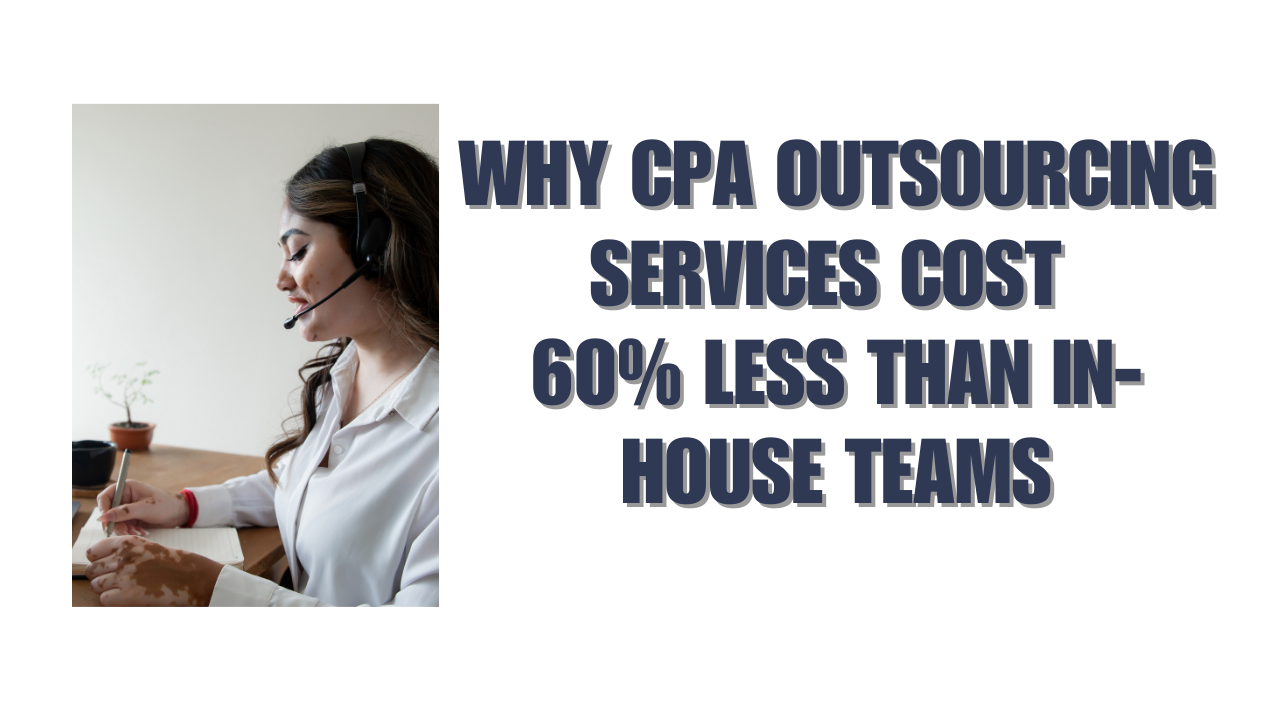CPA outsourcing services provide a surprising solution to financial management challenges. The statistics paint an interesting picture – 50% of outsourcing attempts fail and 70% take longer than expected. But companies that get it right see a 20% boost in efficiency, and small-to-mid-sized businesses enjoy an 11.5% increase in annual revenue growth.
Our experience shows that outsourcing accounting tasks delivers more than just cost savings. CPA firms that partner with outsourcing providers have cut their overhead by up to 10%. The approach lets us concentrate on core business functions while financial experts handle the complex tasks. Your business location doesn’t matter – whether you need CPA outsourcing services in Chicago, Boulder, or anywhere in the US, the benefits go far beyond the balance sheet. The services cost less than internal operations, and you gain access to specialized skills that might not exist in your current team.
This piece breaks down the reasons why CPA outsourcing services cost less than an in-house team. You’ll learn what drives these savings and how to get the best return on your investment.
Why CPA outsourcing is 60% cheaper: the cost breakdown
The numbers tell a compelling story about CPA outsourcing services and their financial benefits. Current data shows businesses can cut costs by up to 50% compared to keeping their accounting teams in-house. Here’s a detailed breakdown of these savings.
1. Salary and benefits savings
Employee compensation packages create the biggest expense. An accountant’s average salary climbed to NZD 136,281.67 in 2023. Employers must also cover additional benefits like health insurance, retirement plans, and paid leave that add NZD 22,170 per employee each year.
The cost difference becomes clear quickly. Offshore accounting professionals charge just NZD 13.64-12 per hour while domestic talent costs NZD 51.17-60 per hour. This gap alone reduces personnel expenses by more than half.
2. No overhead or infrastructure costs
Running an in-house accounting department demands much infrastructure investment. Companies need office space, computers, accounting software licenses, and secure IT systems. Industry analysis shows outsourcing cuts these overhead costs by 40% on average.
Your service provider handles software upgrades, maintenance, and security responsibilities. This creates a streamlined operation that reduces fixed expenses on your balance sheet.
3. Pay-as-you-go pricing models
Traditional accounting departments cost the same regardless of workload. CPA outsourcing services offer flexible payment structures where you “pay just for the resources used when needed”.
Providers typically give you several pricing choices:
- Hourly rates for occasional support
- Fixed monthly fees for consistent services
- Per-transaction pricing for high-volume operations
- Custom packages tailored to specific needs
This flexibility lets you adjust services based on your needs and turns fixed costs into variable expenses.
4. Lower training and onboarding expenses
Many businesses overlook the financial impact of recruiting, training, and developing accounting staff. New hires need substantial investment before they become productive. Small-to-medium firms find it hard to “bear the cost of taking a graduate from university and training them for two or three years”.
Outsourced services give you instant access to pre-trained experts with specialized knowledge. You save on orientation periods, professional development costs, and avoid productivity losses during training.
Key factors that influence outsourcing cost savings
Your business can save money through CPA outsourcing, and these key factors determine how much you can save while keeping service quality high.
1. Type of services outsourced
Different accounting functions save you different amounts when outsourced. Basic tasks like bookkeeping, data entry, and accounts payable/receivable processing give you the best value. Complex services such as financial strategy or tax planning might save you less. You’ll save the most by outsourcing standard, clearly defined tasks that don’t need direct client contact.
2. Business size and complexity
Your company’s size and how complex your operations are will affect your potential savings. Big businesses with many transactions spend more but often save more through economies of scale. Companies that deal with multiple currencies or various payment methods need more resources from providers, which can change the cost-benefit equation.
3. Location of the outsourcing provider
The provider’s location makes the biggest difference in savings. U.S.-based accountants usually charge NZD 51.17-60 per hour, while offshore professionals cost only NZD 13.64-12 hourly. Each region has its benefits:
- U.S./U.K. providers: Higher rates but better time zone alignment
- Nearshore options (Latin America/Eastern Europe): Good mix of cost and accessibility
- Offshore providers (India/Philippines): Best prices but possible time zone issues
4. Technology and automation used
Modern technology boosts cost savings. Cloud-based accounting systems cut down infrastructure costs and automation tools reduce labor expenses. Companies using these solutions spend less on hardware, software maintenance, and IT support. Businesses that combine outsourcing with tech investments create efficiency multipliers that boost both savings and productivity.
5. Contract terms and service levels
The way you structure your agreement shapes your costs. Here are your options:
- Fixed-price contracts: Set costs no matter the workload
- Time-and-materials: Pay for actual hours and resources used
- Cost-plus arrangements: Cover actual costs plus agreed markup
- Managed service agreements: Subscribe with defined service levels
Each option works differently depending on what your business needs and how much risk you’ll accept. Good contract terms help avoid surprise costs and maintain service quality.
In-house vs outsourced CPA teams: a 2025 comparison
The choice between in-house and outsourced CPA teams goes beyond just costs when we look ahead to 2025. A hands-on comparison shows key differences in several vital areas.
1. Cost per employee vs cost per service
Outsourcing makes more financial sense. The 2025 market shows in-house accountants earning £45,000 to £65,000 yearly, plus employer payments of roughly 15% in National Insurance and 3% toward pensions. Outsourced accounting packages for SMEs cost between £60 to £450 monthly – a fraction of what you’d spend on an internal team. Businesses that outsource their accounting can cut costs by up to 30%.
2. Flexibility and scalability
Internal accounting teams create fixed structures, while outsourced services adapt easily. External providers handle workload changes smoothly, which helps during tax season, audits, or fundraising. Growing businesses need more staff, better software, and bigger departments when scaling an in-house team. CPA firms using outsourced services can expand their capacity without hiring delays.
3. Access to specialized expertise
You get a whole team of specialists with outsourced services instead of relying on in-house generalists. External firms work like “financial think tanks” and connect you right away with fractional CFOs, certified accountants, and financial analysts. CPA firms struggling with skill gaps (74% can’t fill specialized roles) get expert help without expensive hiring campaigns.
4. Risk and compliance management
Compliance requirements keep changing, creating challenges either way. Internal teams must keep up with new regulations while handling daily finances, often without IT or legal backup. Outsourcing services lead the way in compliance, with investments in advanced accounting systems and cybersecurity. Their expertise helps companies traverse complex tax codes across states and avoid expensive penalties.
How to maximize ROI from CPA outsourcing services
Businesses need strategic implementation to get the most value from accounting outsourcing partnerships. Smart planning and execution will help companies get much higher returns when they invest in external expertise.
1. Choose the right pricing model
Your choice of financial arrangement will affect your bottom line. Providers usually give you several options:
- Hourly/Time-based: Charges based on actual hours worked—ideal for variable scope projects
- Fixed-price: Set costs for specific deliverables—perfect for routine tasks with clear parameters
- Retainer-based: Monthly recurring fees for ongoing support—suits businesses needing consistent assistance
- Pay-as-you-go: Usage-based billing with no long-term commitment—excellent for seasonal demands
Your company’s specific needs determine the best model. CPA outsourcing services in Chicago might work better with retainer models during tax season. Boulder-based firms with steady workflows often choose fixed arrangements.
2. Use automation to reduce manual work
The combination of automation and outsourcing creates a powerful efficiency boost. AI-powered systems can process big data volumes in minutes instead of hours. These systems automatically handle:
- Invoice matching and bank reconciliations
- Data entry and transaction cataloging
- Payroll processing and compliance filing
This approach cuts labor costs by 40-60% and reduces human errors at the same time.
3. Outsource only what you need
You should map your processes and identify tasks suitable for delegation before you engage CPA outsourcing services. Focus on standardized, well-laid-out activities rather than strategic functions that need client relationships.
4. Monitor performance and adjust scope
Clear metrics will give you accountability and continuous improvement. Key KPIs you should track include:
- Accuracy rates and turnaround times
- Project completion rates (target 95%)
- Quality of deliverables (target 90% positive client reviews)
- Cost efficiency (minimum 30% reduction compared to in-house)
Regular performance reviews help you refine your approach and ensure CPA outsourcing services deliver great value consistently.
Conclusion
Numbers tell a compelling story about CPA outsourcing services versus in-house accounting teams. Companies can cut operational costs by up to 60% and get access to specialized expertise they couldn’t afford otherwise. These cost reductions come from eliminated salaries, lower overhead costs, flexible pricing options, and reduced training expenses.
Your actual savings depend on several key factors. Your financial operations’ complexity, your provider’s location, the services you outsource, and your technology setup are vital parts of cost efficiency. The right contract structure will give you the flexibility to pay for exactly what you need.
CPA outsourcing services offer more than just cost benefits. Your company can adjust its financial operations based on seasonal needs or growth. You’ll also get immediate access to expert knowledge without spending time on hiring or training.
The right implementation strategy makes all the difference. You’ll get the best results by picking the right pricing model, combining automation with human expertise, outsourcing appropriate tasks, and setting clear performance goals.
The digital world keeps changing faster, but CPA outsourcing services will likely maintain their cost advantage through 2025 and beyond. Companies that adopt this approach not only reduce expenses but also improve their operations and get world-class financial expertise at a fraction of the usual cost.






